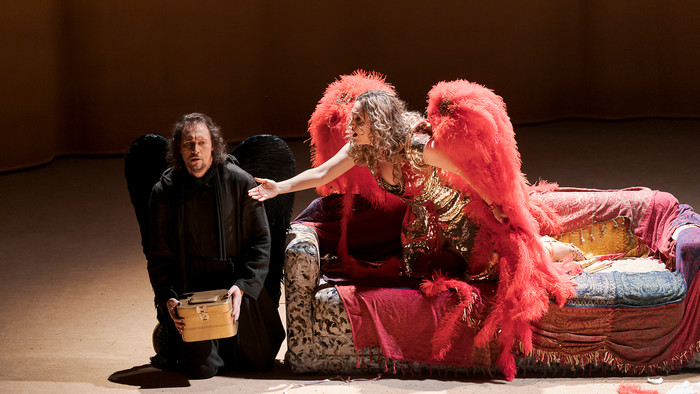Cast & Crew
Thais – Nicole Chevalier
Athanaël – Josef Wagner
Nicias – Roberto Saccà
Crobyle – Carolina Lippo
Director – Peter Konwitschny
Conductor – Leo Hussain
Set and costume designer – Johannes Leiacker
Lighting Designer – Guido Petzold
Description
Jules Massenet wrote his opera about the penitent courtesan for the woman he loved, the Californian soprano Sybil Sanderson. The libretto is based on the novel of the same name by Anatole France which appeared in 1890 and caused a scandal. Massenet’s opera tones down the novel’s anticlerical, satirical elements and shows the two main protagonists as victims of tragic delusion. Despite a scandalous exposure of Sanderson’s breasts, the first performance in 1894 was not particularly successful. Following a thorough revision, the second version, premiered in 1898, was a global success and was even turned into a silent movie – with singers. On stage the work stands or falls with the singer performing the title role. Thaïs is a difficult part, both to sing and to act. Massenet’s score bears the hallmarks of fin-de-siècle style: it is seductive, poetic and melancholy. But it is more than just a lustrous, glossily elegant veneer, a criticism that long hampered further success after 1930. From the outset, Massenet’s subtle psychological portrayal hints that neither Athanaël’s celibacy nor Thaïs’ dissoluteness is really irreversible. The famous Méditation reveals what is going on inside Thaïs during her conversion. The work’s sophistication is also demonstrated by a web of musical motifs that culminate in the Méditation and the tragic dénouement. In the mirror aria, Thaïs’ reflection on her life that leads to her conversion, Massenet attains a fusion of words and music that epitomises French opera and influenced later composers such as Debussy. With the big scenes and ballet sequences Massenet links the structure of Thaïs to grand opéra but what he really shows is the personal drama of two individuals and the misguided, misunderstood feelings they have for one another. Their fates, unlike those of the protagonists in Rossini’s Guillaume Tell or Verdi’s Don Carlos, are not connected to high-level politics. Instead we see how the way the roles of men and women are defined in this patriarchal society make relationships impossible.
Summary
Athanaël lives in the desert in a monastic brotherhood with other ascetics. They have forsaken all worldly goods and desires. But this is not enough for Athanaël: he is ambitious and wants to convert others to his way of life. His aim is to lead the most famous courtesan in all Egypt, Thaïs, to God. He travels to Alexandria, where he grew up. There he encounters his childhood friend Nicias with whom he once shared adventures centred very much on earthly pleasures. But at some point Athanaël heard God’s call and renounced this life of wild abandon. Nicias, on the other hand, did not and became very successful. He has amassed a huge fortune and can afford to keep the most costly mistress – and this is currently Thaïs. Athanaël, although disgusted by all the decadence his former friend wallows in, nevertheless accepts an invitation to a banquet so that he can approach Thaïs. And he does indeed succeed in drawing her into a conversation and is able to speak to her about his mission. Thaïs, though, merely laughs at him. But later, when she is alone, it becomes clear that she no longer finds fulfilment in her life and fears growing old. Athanaël refuses to give up and continues to try to win her over. When he again talks to her of God’s love and of contempt for all matters of the flesh she becomes thoughtful. In the end she sees a chance of a new life in Athanaël’s ideas and agrees to let him take her to a convent. Her hedonistic admirers at first prevent her from leaving, but Nicias, with heavy heart, distracts the crowd with money and so allows them to escape. To reach the convent they must cross the desert. Thaïs’ strength fails her and she collapses. Suddenly Athanaël realises that he loves Thaïs – with both soul and body. He now sees his fanatical rejection of sensuality and love as a mistake. He confesses his feelings to Thaïs and begs her to love him in return. But it is too late, Thaïs is dying. She firmly believes in Athanaël’s promises of salvation through God and has a vision of herself in heaven while Athanaël is still asking her to love him. She dies without hearing or understanding his words.
